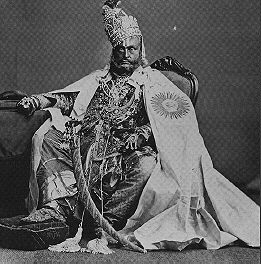|
BANDHAVGARH

|
|
| |
Shriman
Bandhavesh Maharaja Shri Raghuraj Singh Ji Ju deo
Bandhavgarh |
|
The
state of Rewa owes its origins to the foundation of a state dating
to 1234 by Vyaghra Dev, a descendant of the Vaghelas of Gujarat.
He married the daughter of the Raja of Pirhawan and conquered the
territory between Kalpi and Chandalgarh. Karan Dev, son of Vyaghra
Dev married the daughter of the Raja of Ratanpur, bringing
Bandhogarh ( Now Known as BANDHAVGARH) into the family as her
dowry.
The legendary fortress of Bandhogarh fell into Mughal hands in
1597, almost by accident. At the death of H.H. Maharaja Virbhadra
Rao in 1593, his minor son succeeded as H.H. Maharaja Vikramaditya.
Sent to Delhi for his own safety, the emperor took advantage of
his absence to send one of his loyal nobles as temporary governor.
Once he had taken control of the fort, the Maharaja’s nobles and
officials were expelled and the fort annexed by the Mughals. On
his return to his remaining domains, H.H. Maharaja Vikramaditya
was forced to establish a new capital at Rewa, from whence the
state took its name.
Successive contests with the Marathas and the Pindaris reduced the
power of the Baghels considerably. Territories were lost and huge
debts incurred in paying out ransom to these invaders. Although
there were some successes, notably by Maharaja Ajit Singh ji
against Peshwa Baji Rao in 1796, relief did not arrive until the
treaty of alliance with the HEIC in 1812. The protection
afforded by the treaty and the ultimate defeat of the Marathas,
allowed the rulers to concentrate on re-establishing control,
developing the administration, making regular collections of
revenue and achieving some successes in development and social
progress. H.H.Maharaja Shri Vishwanath Singh Ji ju Deo, who took
over the administration in 1813, succeeded in abolishing suttee
and female infanticide.
Virtually all the subsequent rulers were keen scholars who
patronized the arts, literature and education. Amongst them,
perhaps H.H. Maharaja Shri Raghuraj Singh Ji Ju Deo could be
counted as the greatest. Though hugely old fashioned in many ways
and near medieval in appearance, his shrewd dealings with the
British ensured a free hand in most things. He supported the
British during the Mutiny in 1857 and received in reward a
considerable increase in his territories, the first in a century
of continuous decline. However, in his declining years, financial
difficulties forced him to accept a British appointed
administrator.
H.H. Maharaja Shri Venkat Raman Singh Ji Ju Deo succeeded his
father H.H. Maharaja Shri Raghuraj Singh Ji Ju Deo in 1880. Like
him, a keen scholar and patron of learning, H.H. Maharaja Shri
Venkat Raman Singh Ji Ju Deo earned himself distinction as a model
ruler. Like his father, he also supported the British,
particularly during the Great War. Although ruler of a
comparatively small state, the contributions to the war effort
were enormous, amongst them the famous “Solanki Squadron” of the
Army Flying Corps. He died in 1918, one of the victims of the
world-wide influenza epidemic, leaving his throne to his fifteen
year old son.He is now best known for killing 111 tigers, 109
being the traditional number regarded as lucky.
H.H Maharaja Shri Gulab Singh ji Ju Deo reign began full of
promise. Much trouble had been taken over his education, and his
regency had afforded an opportunity for modern methods of
government and administration to be introduced into the state. For
some years, he ruled with considerable success, even being
recognized with the higher title of Maharajadhiraja in 1930. When
war broke out in 1939, just like his father and grandfather before
him, he offered unstinting service to the King-Emperor. Alas, in
1942 he came under suspicion of conspiracy to murder a British
official. The outcome of the inquiry went against him and he was
ordered to reside outside the state in Bhopal. Once his only son
had gained some experience, he abdicated in his favor in 1946.
Maharaja Martand Singhji inherited his throne just long enough to
preside over the loss of ruling powers to a free India. He acceded
to the Dominion of India in 1947 and merged his state into the
Vindhya Pradesh Union in 1948. As the senior ruler in the region,
he served as its first and only Rajpramukh. During the rest of his
reign, he concentrated much of his efforts on animal conservation,
in particular the protection of the Indian tiger, The WHITE TIGER
is a gift to the world by him. The creation of the world-famous
Bandhogarh National Park in 1968 was largely due to his efforts,
and her served as a highly popular and successful member of a
number of animal conservation organizations. Satna and other
properties were donated to establish educational institutions like
Satna College and Railway Station . He died in 1995 and was
succeeded as head of the dynasty by Maharaja Pushpraj Singh Ju Deo.
The latter continues his father’s interest in wildlife and
conservation.
Mobile No. 094 2497 3602
|
|